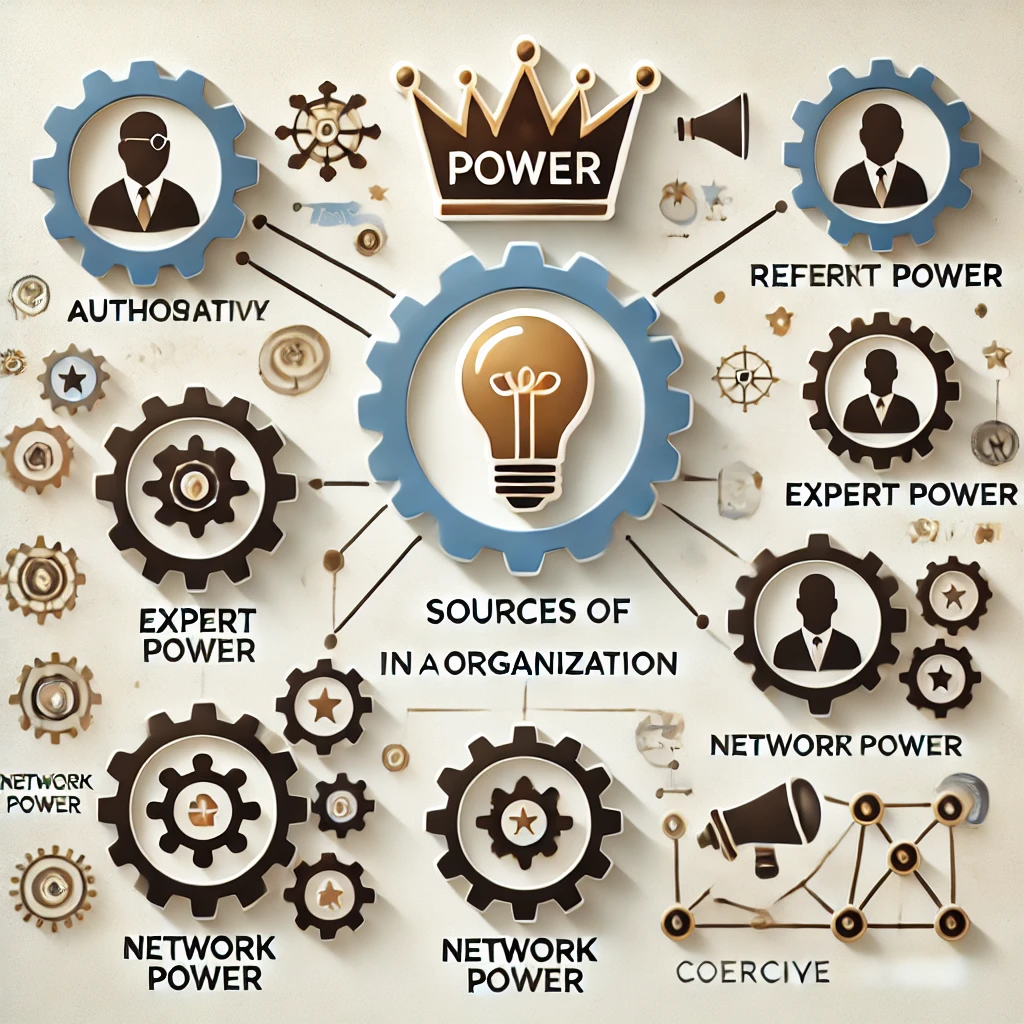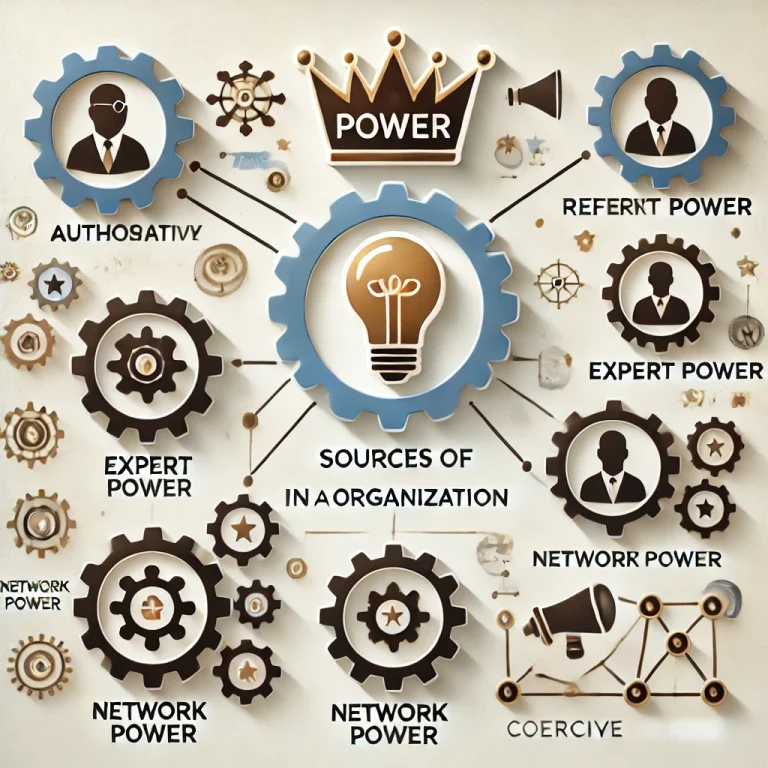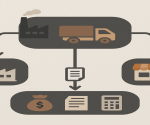Sources of power play a strong role in organizational behavior, determining how leaders and other people influence and guide action. Power doesn’t take just one form, but rather different sources used by leaders and influencers that affect relationships, productivity, and even the success of an organization in different ways. It covers five major sources of power: legitimate power, expert power, referent power, coercive power, and reward power, and facilitates the reader to understand unique characteristics and applications.
What is Sources of Power?
Sources of power are the sources of one’s ability to influence or control the behavior of others in a given setting. Organizations do not have strict hierarchies when it comes to power since it could originate from one’s expertise, position, rewards, and even personal charisma. There are multiple sources of power, as described below, that offer different tools for the management of teams, the inspiration of colleagues, or even the pursuit of personal goals.
Legitimate Power
A more common term for legitimate power is “positional power.” It derives from a formal position or role within an organization. When a person holds the title or rank of manager, CEO, or any leadership position, he or she automatically wields authority over others to whom he expects obedience in his decisions.
Understanding Legitimate Power
It is one of the most common forms of power in structured organizations and is critical to maintaining order and achieving organizational objectives. This power source relies on formal organizational hierarchy and often requires policy and procedure support to be effective.
Characteristics:
- Rooted in position and role
- Defined by organizational structure
- Supported by organizational policies
- Example: A team leader in a project may have the legitimate power to assign tasks to team members, expecting their compliance due to the authority given by the organization.
Expert Power
Expert power is based on expertise, skills, knowledge, or special know-how by a person in an area. This form of power is highly respected as it bases respect on what one knows rather than on what a title may suggest.
Understanding Expert Power
Individuals who have expert power are always sought for the know-how and input they provide. Power makes those individuals gain influence regardless of holding minimal formal titles. In a dynamic industry, such as technology, finance, or healthcare, expert power is much valued and greatly impacts the processes of making decisions.
Characteristics:
- Based on skill, experience, and knowledge
- Not necessarily tied to a formal position
- Highly influential in technical or specialized fields
- Example: A senior engineer with extensive coding knowledge may have considerable influence over project decisions, even if they don’t hold a managerial position.

Referent Power
Referent power comes based on the personality and charisma of a person. People with referent power can instill loyalty, admiration, and respect in people around them and make others emulate their ways of life.
Understanding Referent Power
A referent power is the power established over another person because of a trust and emotional bond between them. In this case, the leader with this kind of power type is likely to create motive and loyalty within the followers and is therefore very useful in team-oriented and collaborative environments.
Characteristics:
- Driven by personal charisma and relationship-building
- Creates loyalty and commitment
- Effective in team-oriented environments
- Example: A charismatic CEO who connects deeply with employees may encourage them to work harder and achieve more, thanks to the respect and admiration they inspire.
Coercive Power
Coercive power is exercised on the capability to give punishment or take away rewards, which controls behavior because of the fear of bad consequences. This kind of power usually is received negatively and should be used as little as possible so that there is no resentment or loss of morale.
Understanding Coercive Power
While the effectiveness of coercive power is assured in a situation where compliance must be swift, it may not generate respect for the authority figure. Employees might disengage if they encounter coercive power too often. It is applied only when it is imperative and fairly and transparently.
Characteristics:
- Relies on fear of punishment or repercussions
- Effective for immediate compliance
- This can lead to negative perceptions and resentment
- Example: A manager threatening to reduce bonuses for poor performance is utilizing coercive power to encourage team members to meet their goals.
Reward Power
Reward power is the opposite of coercive power and works on the factor of giving rewards or incentives. This power motivates people by providing rewards or incentives in the form of bonuses, recognition, promotions, etc., or extra time off.
Understanding Reward Power
Reward power might encourage the motivation and morale of people to work more effectively. And if used judiciously, reward power’s impact can be significant. The leaders holding rewarding power may positively affect behavior by motivating every member of the team to work better for incentives.
Characteristics:
- Based on positive reinforcement and incentives
- Encourages motivation and improved performance
- Should be applied consistently to be effective
- Example: A sales manager who rewards top performers with a monthly bonus is leveraging reward power to drive sales and meet targets.
Understanding these bases of power is, therefore important in leadership, employee, and team context. Appropriate wielding of legitimate, expert, referent, coercive, and reward power sources makes individuals develop meaningful relationships, enhance productivity, and influence others to act positively. All these kinds of power find a place in the position, and effective leadership most often requires balance in using all of them appropriately to inspire, guide, and maintain harmony.
Sources of Power FAQs
What are the key sources of power in an organization?
Legitimate, expert, referent, coercive, and reward power are the primary sources influencing organizational dynamics.
Can one person have multiple sources of power ?
Yes, individuals often hold multiple power types, such as a manager with legitimate and expert power.
How does referent power differ from legitimate power?
Referent power is based on personal charisma, while legitimate power stems from one’s formal position or title.
Is coercive power effective in the long term?
Coercive power may yield short-term compliance but can lead to resentment if overused.
How can reward power benefit employee morale?
By recognizing achievements and providing incentives, reward power encourages productivity and morale among team members.


